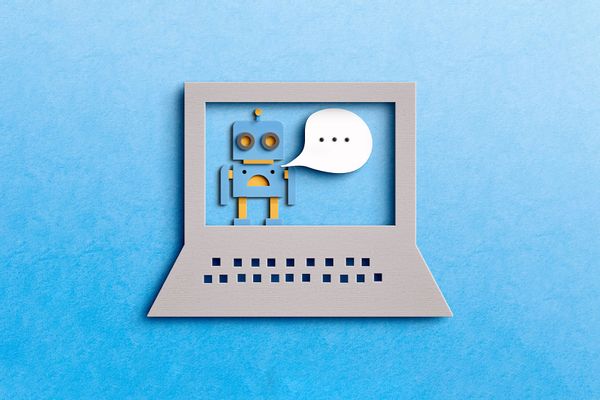Philip K. Dick had some strange ideas about the future. In his 40-plus novels and 121 short stories, the science fiction author imagined everything from "mood organs" which allow users to dial up an emotional state including "the desire to watch TV, no matter what's on" to pay-per-use doors that refuse entrance or exit without sufficient coinage. Characters in Dick's mind-bending novel "Ubik" (published in 1969 and set in 1992) include a psionic talent scout named G.G. Ashwood, who wears "natty birch-bark pantaloons, hemp-rope belt, peekaboo see-through top and train engineer's tall hat" and a taxi driver wearing "fuchsia pedal pushers, pink yak fur slippers, a snakeskin sleeveless blouse, and a ribbon in his waist-length dyed white hair."
Dick's great talent was in recognizing that our anxieties about technology are often misplaced fears we harbor about ourselves.
But our weird present is looking increasingly like a Philip K. Dick future. While we may not have Deckard's flying car from "Blade Runner" (adapted from Dick's novel, "Do Androids Dream of Electric Sheep?"), many of the author's predictions have materialized in real life after appearing on the big screen, including Dick's fondness for robo-taxis (who can forget the lovable Johnnycab from 1990's "Total Recall"?), and the predictive policing Dick called "pre-crime" in his 1956 story, "Minority Report," which hit the big screens in 2002 with the help of Steven Spielberg and Tom Cruise. And now it looks like Philip K. Dick may also have predicted ChatGPT.
Dick's 1964 novel "The Penultimate Truth," begins with character Joseph Adams hunkering down in "an Ozmandiasian structure built from concrete chunks that had once in another age formed an entrance ramp to the Bayshore Freeway" to compose a speech with the help of his "rhetorizor":
The text of the scene below has been lightly edited for length and clarity.
At the keyboard of the rhetorizor he typed, carefully, the substantive he wanted. Squirrel. Then, after a good two minutes of sluggish, deep thought, the limiting adjective smart.
"Okay," he said, aloud, and sat back, touched the rerun tab.
The rhetorizor, as Colleen reentered the library with her tall gin drink, began to construct for him in the aud-dimension. "It is a wise old squirrel," it said tinnily (it possessed only a two-inch speaker), "and yet this little fellow's wisdom is not its own; nature has endowed it —"
"Aw god," Joe Adams said savagely, and slapped off the sleek, steel, and plastic machine with all of its microcomponents; it became silent.[…]
"Dear," Colleen said, and sighed, "I heard you type out only two semantic units. Give it more to ogpon."
"I'll give it plenty to ogpon." He touched the on-tab, typed a whole sentence, as Colleen stood behind him, sipping and watching, "Okay?" [...]
She read the sentence aloud, "The well-informed dead rat romped under the tounge-tied pink log."
"Listen, " he said grimly. "I want to see what this stupid assist that cost me fifteen thousand Wes-Dem dollars is going to do with that. I'm serious; I'm waiting." He jabbed the rerun tab of the machine." [...]
The rhetorizor, in its cricket's voice, intoned folksily, "We think of rats, of course, as our enemy. But consider their vast value in cancer research alone. The lowly rat has done the yeoman's service for huma—"
Again, at his savage instigation, it died into silence."
[Joe's wife prods him to write the speech himself] He thought, "I don't think I could do it, in my own words, without this machine; I'm hooked on it, now."
[Joe reveals he's been ordered by his "bureau in Geneva" that the speech he's writing "has to use a squirrel as the operational entity."]
On the keyboard of the rhetorizor he vigorously, with deliberation, punched two new semantic units. Squirrel. And — genocide.
The machine, presently, declared, "The funniest thing happened to me on the way to the bank, yesterday."
Dick's rhetorizor seems to function much like current large language models like ChatGPT, generating prose based on the relationships between words. Dick describes the machine's internal process: "Inside it thousands of micro-components spun the problem from a dozen drums of info-data." Like ChatGPT, the more input the rhetorizor is fed, the better its output. (Your guess is as good as mine as to the etymology of "ogpon." "Cogitate upon"?) However, Dick's machine seems specialized to spew out propaganda tailored to a central metaphor supplied by the user.
While the "wordmills" in Fritz Leiber's 1961 novel "The Silver Eggheads," Orwell's "novel writing machine" in "1984," and "The Engine" in Jonathan Swift's 1726 satire "Gulliver's Travels" all appear in print earlier, none of these automated writing systems is quite as bleak and corny as Dick's rhetorizor.
 Artificial Intelligence Chatbot concept (Getty Images/Carol Yepes)Dick's novel takes place in a post-apocalyptic world where much of the population lives underground in "ant tanks," believing the surface to be uninhabitable. Turns out the rich just want the sunshine to themselves so they've been lying to the "tankers" for decades. (If that sounds far-fetched, check out "Survival of the Richest: Escape Fantasies of the Tech Billionaires," Douglas Rushkof's 2022 book outlining exactly how the One Percent are plotting to leave us Morlocks to fend for ourselves.)
Artificial Intelligence Chatbot concept (Getty Images/Carol Yepes)Dick's novel takes place in a post-apocalyptic world where much of the population lives underground in "ant tanks," believing the surface to be uninhabitable. Turns out the rich just want the sunshine to themselves so they've been lying to the "tankers" for decades. (If that sounds far-fetched, check out "Survival of the Richest: Escape Fantasies of the Tech Billionaires," Douglas Rushkof's 2022 book outlining exactly how the One Percent are plotting to leave us Morlocks to fend for ourselves.)
In "The Penultimate Truth," so-called Yance men – the elite working for the Agency in charge of animating a holographic leader named Talbot Yancy – use the rhetorizors to compose speeches to motivate the tankers to maintain their production of leadies, robots the tankers believe to be fighting in the war but which have been repurposed as servants for the surface elite.
In Dick's fiction, technology becomes a funhouse mirror that shows us who we really are.
Artificial intelligence is already writing essays for students, ad copy for marketing firms, and briefs for lawyers, striking fear in the soft fleshy hearts of human writers everywhere. But as Dick pointed out in his novel, when artificial intelligence is used to script the news, an entire society can operate under a delusion. At least Orwell's Ministry of Truth was run by red-blooded bureaucrats.
In April the Republican party aired an anti-Biden commercial with images of Taiwan under attack, shuttered storefronts and border chaos, all produced by artificial intelligence. In our own Dickian dystopia we don't know if we're being gaslit by a human being or a machine because the boundary between the two is dissolving. There's something deeply unsettling about an artificial intelligence operating under unknown control. And yet many of us struggle to discern our own motives. Large language models are prone to both bias and a form of "artificial hallucination," but so are we. Dick's great talent was in recognizing that our anxieties about technology are often misplaced fears we harbor about ourselves.
In Dick's 1981 novel, "The Divine Invasion," a computer intelligence known as "The Big Noodle" not only monitors global security threats, but also creates pop stars like Linda Fox (who Dick modeled off his mega crush, Linda Ronstadt). "The Al system had invented her, told her what to sing and how to sing it; Big Noodle set up her arrangements even down to the mixing. And the package was a complete success," Dick writes. In our world, singers Drake and Weeknd already have been digitally replicated, and the "Vocaloid software voicebank" Hatsune Miku has been a simulated popstar since 2007.
Want a daily wrap-up of all the news and commentary Salon has to offer? Subscribe to our morning newsletter, Crash Course.
If you know anything about Dick's life, it is very easy to imagine "The Penultimate Truth's" Joe Adams, frustrated by the hackneyed phrases being spit out by his rhetorizor, as a stand-in for Philip K. Dick, fidgeting at his typewriter in 1964, under contract to produce two novels at the same time, furiously combining shopworn science fiction tropes in endless combinations: robots, time travel, mass surveillance, nuclear war, artificial intelligence. Dick wrote 16 novels between 1960-1964.
In Dick's fiction, technology becomes a funhouse mirror that shows us who we really are. Androids and automation stand in for the calculated way art and commerce are conducted under late capitalism. So the fact that we now find ourselves confronted with technologies Dick dreamt up as far-out cautionary tales should give us pause. If Dick is right, artificial intelligence won't destroy us with a Skynet-style take over, but will instead render us like machines, soullessly programmed to a purpose other than our own.



Shares